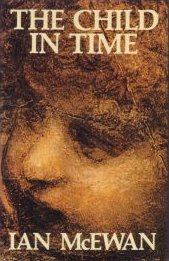
The Child in Time
Encyclopedia

Novel
A novel is a book of long narrative in literary prose. The genre has historical roots both in the fields of the medieval and early modern romance and in the tradition of the novella. The latter supplied the present generic term in the late 18th century....
by Ian McEwan
Ian McEwan
Ian Russell McEwan CBE, FRSA, FRSL is a British novelist and screenwriter, and one of Britain's most highly regarded writers. In 2008, The Times named him among their list of "The 50 greatest British writers since 1945"....
. It won the Whitbread Novel Award for that year. The story concerns Stephen, an author of children's books, and his wife, two years after the kidnapping of their three-year-old daughter Kate.
Plot
The book is set in a dystopian near future at the end of the twentieth century. The book was written in 1987, during the time of the ThatcherThatcherism
Thatcherism describes the conviction politics, economic and social policy, and political style of the British Conservative politician Margaret Thatcher, who was leader of her party from 1975 to 1990...
government, and the British Prime Minister features in the narrative. The gender of the politician is never revealed, however.
Stephen Lewis is, by his own admission, an accidental author of children's books. One Saturday, on a routine visit to the supermarket, during a concentration lapse, he loses his only daughter, Kate. Since then, the only purpose in his life is that he is a member of a committee on childcare. Otherwise he spends his days lying on the sofa drinking scotch and watching mindless TV programmes and the Olympic games. His wife, Julie, has become a recluse, and he visits her very rarely. He has a close friend, Charles Darke, who published his first novel and who is now a junior Minister in the Cabinet, and the Prime Minister's favourite. His own wife, Thelma, is a quantum physicist. She engages Stephen with her outlandish theories on time and space. However, his friends' lives are about to change irrevocably in a way he cannot understand, and he is a helpless bystander.
Eventually Stephen experiences a strange event that he cannot explain: he sees his parents as a young couple in a pub, before they married. The book also deals with his grief and eventually his painful acceptance of the loss of his child.
Themes
The book deals with the theory that time is relative, and can be fluid and unstructured. In one respect it can be viewed as a time travelling story. At the very core of the novel is the "child in time" — Stephen himself — appearing to his mother as a child's face at a window, which makes her decide to keep the child, him, rather than to abort.It also explores the way both Stephen's and Julie's lives disintegrate after Kate's disappearance, and how an unexpected event at the very end of the book may bring them back together.

